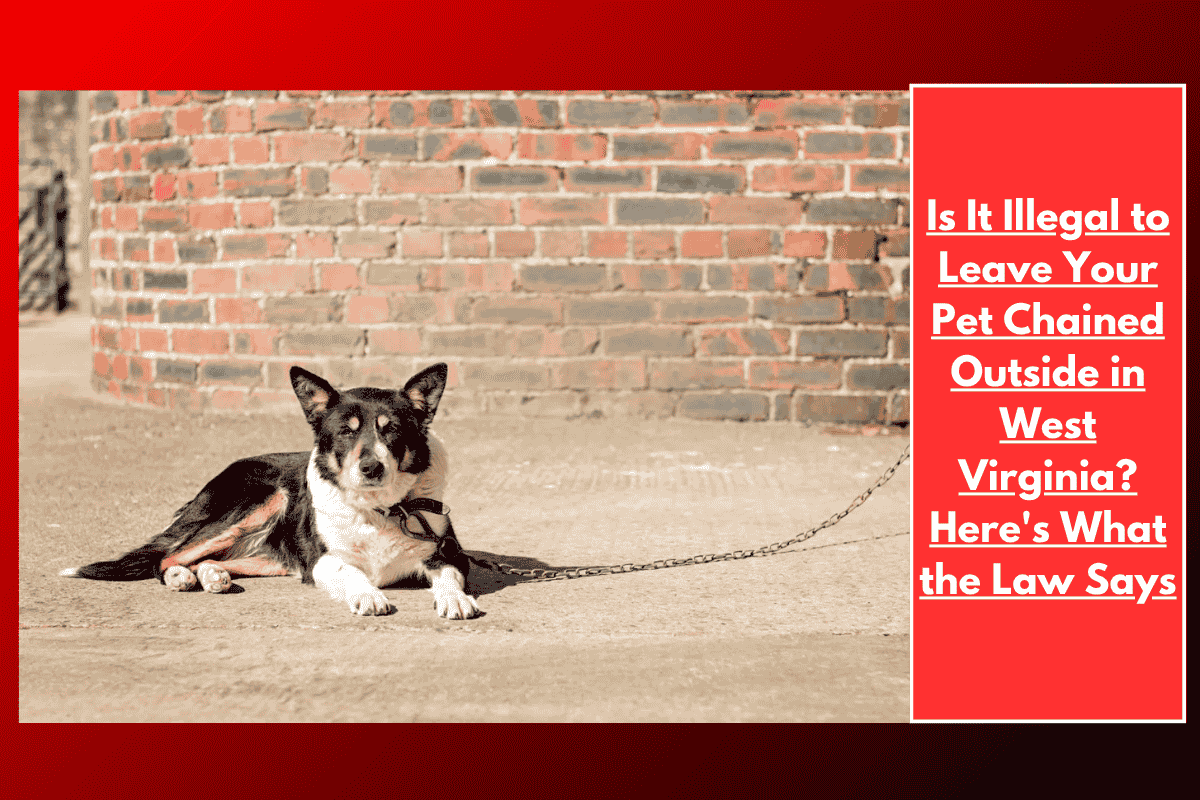Leaving a pet chained outside is an issue that has raised concerns across the United States, and West Virginia is no exception. The practice of chaining pets outdoors can lead to various risks for animals, including exposure to harsh weather conditions, limited mobility, and injury. So, is it illegal to leave your pet chained outside in West Virginia? Here’s what you need to know about the laws in the state and what is considered animal cruelty.
West Virginia’s Laws on Animal Cruelty
West Virginia, like many other states, has laws designed to protect animals from cruelty and neglect. These laws cover a wide range of mistreatment, including inadequate shelter, lack of food and water, and improper confinement of pets.
Under West Virginia’s animal cruelty laws, owners are prohibited from neglecting their pets in a way that causes harm. This includes leaving animals outside without proper shelter or care. However, these laws don’t specifically ban chaining pets outdoors, but they do require that animals be provided with basic care, including proper shelter from the elements.
When Does Chaining a Pet Become Illegal?
While it is not explicitly illegal to chain a pet outside in West Virginia, the situation can cross the line into illegal behavior under certain conditions. The state’s animal cruelty laws require pet owners to ensure that their animals are not subjected to inhumane living conditions. If chaining a dog causes suffering or harm, this could violate animal cruelty statutes.
Here are the key points to consider:
Proper Shelter: The law mandates that animals have adequate shelter from the weather, including protection from rain, wind, and extreme temperatures. If your pet is chained outside without adequate protection from the elements, it could be considered neglect, and you could face legal consequences.
Tethering Laws: West Virginia does not have a statewide law that bans tethering animals outside, but there are regulations regarding how long pets can be tethered. For instance, tethering should not cause the animal distress or restrict its ability to move. If a pet is chained for extended periods or without access to food, water, and shelter, it could result in charges of animal cruelty.
Animal Suffering: If an animal is left chained in such a way that it cannot move freely, or if it is left outside in extreme weather conditions for prolonged periods, this could be considered abuse. The law takes into account the pet’s physical and mental well-being, and prolonged confinement in such conditions could lead to charges of neglect or cruelty.
Local Ordinances: Some counties and municipalities in West Virginia may have stricter laws regarding the chaining or tethering of animals. For example, some areas may require that pets only be chained for a limited time and mandate that they must have access to food, water, and shelter during that time. Always check with your local animal control office for specific rules in your area.
Penalties for Animal Cruelty
If you are found to be violating animal cruelty laws by improperly chaining your pet or neglecting its basic needs, you could face serious penalties. In West Virginia, animal cruelty is classified as a misdemeanor for the first offense, but it can become a felony if there are multiple violations or if the pet suffers significant harm.
Penalties can include:
Fines
Imprisonment
Seizure of the animal
Prohibition from owning pets in the future
What Should You Do If You See a Pet Left Chained Outside?
If you witness a pet being left chained outside in unsafe conditions, you can report it to local animal control authorities. They will investigate the situation to determine whether the pet is being neglected or subjected to cruel treatment.
In cases where pets are at immediate risk (such as being exposed to extreme weather), animal control officers may intervene and remove the animal to protect its welfare.
Best Practices for Pet Owners in West Virginia
To avoid legal issues and ensure the well-being of your pet, follow these guidelines:
Provide Proper Shelter: If you must leave your pet outside, make sure they have access to a well-insulated doghouse or another form of shelter to protect them from the elements.
Limit Tethering Time: Try to limit the amount of time your pet is chained. Pets should not be tethered for extended periods, and they should have room to move around comfortably.
Access to Water and Food: Always provide your pet with fresh water and food when left outside.
Supervision and Exercise: If possible, supervise your pet and allow them to roam freely in a secure, enclosed area. Regular exercise and human interaction are important for their well-being.
While West Virginia does not have specific laws that ban chaining pets outside, it is important to understand that the practice can lead to legal issues if it results in neglect or cruelty. Pet owners are required to provide adequate shelter, food, water, and protection from the elements for their animals. If chaining a pet outside leads to harm or suffering, it could be considered animal cruelty under state law. Always make sure to follow local ordinances and guidelines to ensure that your pet’s rights and safety are protected.
SOURCES
[1] https://www.animallaw.info/topic/table-state-dog-tether-laws
[2] https://www.animallaw.info/content/map-state-dog-tethering-laws
[3] https://legiscan.com/WV/text/SB150/id/3115455/West_Virginia-2025-SB150-Introduced.html
[4] https://www.peta.org/issues/animal-companion-issues/ordinances/west-virginia/charleston-west-virginia/
[5] https://legiscan.com/WV/text/HB3044/2025














